- Home
- Richard Adams
The Plague Dogs: A Novel Page 44
The Plague Dogs: A Novel Read online
Page 44
“In the front dining-room, sir, by invitation of the good lady. She’s laid on char and wads for them.”
“Good for her. Well, let’s go and see if they’re in contact with B and C company signals yet. Look, here come the helicopters. Not long to go now. Let’s hope it’s over within the hour.”
“They’re going to kill us, Rowf. As soon as it’s light enough for them to see us.”
“How can you tell?”
“I don’t know, but I’m quite sure they mean to kill us. They’re watching us.”
“How can they be? It’s still dark.”
“No, I mean the flies. The flies out of my head. They’ve grown huge—they’re circling round and round over the hills. They can talk to the whitecoats. I dreamt it all.”
“You’re hungry and tired out. Why don’t you go to sleep again?”
“No, I got nearly half the chicken in spite of you, old Rowf; I’m all right. I wish they hadn’t taken the guts out, though. Not half as good as those ones we killed for ourselves, was it? Rowf, it’s the last one we’ll ever steal. I know that.”
Rowf stood up and looked about him.
“No, they’re not here yet, Rowf. But d’you remember the tobacco man had a little window he used to open and look in at us? They can watch us. They’re going to kill us.”
“They’ll have their work cut out with me. Thought you said your master was out there?”
“He is, only he can’t—oh, Rowf, I don’t know what I meant when I said that. I was dreaming. Don’t make it worse!”
“That’s why it’s bad for animals. We don’t know anything, we don’t understand anything. The men could do something for us if they wanted to, but they don’t.”
“There are men all round us. It’s the mouse—the mouse told me.”
Rowf was about to answer when Snitter threw up his head and howled—a long cry of anguish and fear. Two grouse got up and rocketed off into the darkness. Their rattling calls died away and the silence returned—a silence made up of wind in the ling and the rustling of the sedges covering half the surface of the little, lonely Eel Tarn on the edge of Burnmoor, five hundred feet above the Woolpack.
“Snitter, where are those men you talk about? They’ll hear you—”
“I’m howling for my death—no, it’s for yours, poor old Rowf; yours and the tod’s. I can’t remember any more what it was he asked me to say to you. I do so wish I could.”
“ ‘Gan on till the Dark.’ Well, the tod’s got no more to bother him now.”
“I remember one thing he said. He said, ‘It’s not the Dark that frightens me, it’s their riving teeth.’ That’s how I feel, too. I hope it won’t hurt.”
Snitter paused, nose in the wind. Suddenly he said, “We’ve finished being wild animals. That’s all finished. So we’ll go down now.”
“But it’s lonely here—safer.”
“The flies would see us anyway, as soon as it’s light. So we’ll go down.”
“I won’t go back in the tank! I won’t go back in the tank! Rowf! Rowf!”
The wind strengthened across the moor, driving the clouds eastward before it. Snitter began to move slowly away upwind, westward down the course of the little outfall from the Eel Tarn. Rowf followed reluctantly. Soon they came to the Brockshaw Beck, and thence to the big Whillan Beck pouring down off the moor to join the Esk below Boot. Stone walls and sheepfolds loomed up about them in the dark and a solitary light shone out from the village half a mile below. Snitter held on his way, following the Whillan Beck down into the valley.
“Snitter, where on earth are we going?”
“There’s a gully that leads into a drain under the floor. The mouse says we’ve got to find it. It’s that or nothing now.”
On they went, downward, down the course of the noisy beck in spate. Rowf could hear, somewhere beyond them in the dark waste, the rising, bubbling cry of a curlew and the whirring of a snipe disturbed from the bog.
“You say we aren’t wild animals any more?”
“I don’t think we were very good at it really, do you? Only when we had the poor tod.”
“I know. If I were really a wild animal, I’d leave you now, Snitter. Wherever are you taking us?”
“We’ve got to be down the gully before daybreak.”
“But, Snitter, what gully?”
“I don’t know. Oh, look, Rowf, the stones are dancing! D’you remember the white stuff falling out of the sky?”
They clicked and pattered their way through Boot, watched only by the cats on the walls. Once, when a rat ran across the road Rowf, fearful and subdued, let it escape unchased between the stones of the wall. First light was coming into the east and the crinkled summit of Harter Fell showed plainly against the dawn. When they reached the road that leads down the valley, Snitter broke into a run and Rowf followed him, the wound in his neck throbbing as his pulse beat faster with fear.
“Snitter, this is a road, do you realize? Men, cars, lorries—”
“It’s very close,” muttered Snitter. “The gully’s very close now.” As though following a scent, he laid his nose to the ground and ran on.
And now the terrified Rowf could hear plainly the sound of a car approaching behind them. As it grew closer he dashed across to the wall on the opposite side of the road.
“Quick, Snitter, over the wall!”
Snitter jumped the wall after him, his short legs scrabbling at the top before he cleared it and dropped down on the other side. The car drove past. Rowf, lying in a clump of withered goose-grass, docks and dead sorrel, looked about him.
A little way off, a broad strip of the ground was oddly black and granular, and along this some strange-looking metal lines went stretching away into the distance. On these was standing what looked like a row of small, painted carts—or at any rate, wheeled, wooden contraptions not unlike carts—some with roofs and others open to the sky. Beyond them, Rowf could make out a flat, concrete platform in front of what looked like sheds. But all was deserted. There were no men, there was no noise, no paper, no smell of tobacco: only, from somewhere in the distance, a hissing of steam and odour of coal-smoke.
Rowf looked back at Snitter and was appalled to see him curled up under the wall, conspicuous as a plover, apparently in the act of falling asleep. He reached him in one bound.
“Snitter, what in death’s name d’you think you’re doing? You can’t stay there! Get up!”
“I’m tired, Rowf—very tired. The mouse says go to sleep now.”
“To blazes with the mouse! Do you know where we are? We’re in an open field, in full view—”
“I’m tired, Rowf. I wish you and the tod hadn’t pulled me out of my head that day. I might have found out—”
Rowf bit him in the leg, and he stood up slowly and dazedly, as though roused not by pain but rather by hunger or some distant noise. Scarcely able to restrain himself from flight, Rowf urged and bullied him forward until, as they came up to the line of wooden carts-strange they seemed, on their metal wheels, like little rooms or pens, with benches inside—Snitter, of his own accord, made his way up on the concrete platform and there lay down once more. It was at this moment that Rowf heard the unmistakable sound, only a few yards away behind the sheds, of a man’s boots on gravel, and caught a whiff of cigarette smoke.
“Snitter, there’s a man coming! Come on, get in there, quick! Yes, there, under the bench, seat, whatever it is—right to the back!”
Agonizingly slowly, Snitter obeyed. Rowf, following, had just time to flatten his shaggy belly on the boards and crawl under the wooden seat as a man in blue overalls came round the corner of the shed and, with a scraping of nailed boots on the concrete, passed within three feet of them on his way up the platform.
“Driver Orator.”
It was still dark. Digby Driver had a headache. He had not cleaned his teeth the night before, there was a foul taste in his mouth and he was busting for a pee.
“It’s Ted Springer here, Kevin, of
the Meteor. Aren’t you blessing me, eh? I can hear you are! Listen, boy, I’m doing you a good turn, that’s what. The dogs turned up late last night in Eskdale.”
“Eskdale? Where the hell’s that, Ted?”
“North-west of Dunnerdale. The Paras have moved in already. They’re going to start combing out the whole valley as soon as it’s light this morning. Thought you’d like to know. Now aren’t I a nice bloke? The things we do for England, eh? Don’t forget me next time you run into something good, will you?”
“You’re a pal, Ted. Thanks a lot. I’m on my way. See you down there.”
Digby Driver crossed the landing and returned, rinsed out his mouth, put a Polo mint into it, huddled on his clothes and duffle-coat and made his way down into the hall. There was no one about. Thank Christ it wasn’t freezing, anyway. As he was pulling on the muddy gum-boots which he had left in the umbrella-stand (wrought iron, circa 1890), the post came through the letter-box with a stuffing, a scuffling and a papery scraping, and flumped on the mat. From somewhere in the lower regions a warm, well-fed house-dog barked to hear it. Digby Driver had his hand on the Yale latch and was about to open the door when one of the letters caught his eye. It was addressed, in no hand-writing that he recognized, simply to Digby Driver, London Orator Reporter in the Lake District. He picked it up. The postmark was five days old. Someone had endorsed it Try Dunnerdale in violet ink, and below this someone else had written, in red ink, Try Coniston.
He shook it and bent it. It was thin, light and entirely pliant. It was evidently not a bomb.
Digby Driver sat down on the hall settle and split open the envelope.
“Well, here we are in Eskdale and it’s perfectly possible—indeed, it’s more than likely—that we’re going to be in on the last act of this tremendous drama of the Plague Dogs, who’ve had the whole Lake District by the ears—yes, I said by the ears, ha ha—for several weeks past. I’m William Williamson of the B.B.C., of course, as I expect you know, and with me here is Major Aubrey, of the Paratroops—oh, sorry, Awdry, is it? Little Audrey laughed and laughed, no relation, eh, oh well, we’re all disappointed, I’m sure. And Major Awdry is in command of this very necessary and exciting operation to find and shoot these dogs, who’ve been putting on a sort of wild west cattle-rustling act up and down these beautiful Lake District hills ever since they escaped from their Coniston Research Station six weeks ago. Now what’s it feel like, Major, to be in command of a show like this?”
“Well, it’s a job and it’s got to be done.”
“Do you feel like a bounty hunter after desperadoes in Arizona?”
“Not really, no. I feel sorry for the dogs. I like dogs.”
“But not these dogs, eh? They’re something that’s just got to be dealt with at once, of course, before there are any more of these terrible tragedies. Well, that’s very interesting, thank you, Major. Now Major Awdry’s men are out on the fells and meadows of this beautiful Lakeland valley—rather wintry now, but in summer it’s surely one of the great ice-cream carton resorts of England, ha ha—and as we move along the road you can see what a beautiful place it is—careful now, everybody, the dogs might be lurking just behind that shed there, let’s have a look, no they’re not and on we go. Well, here’s the miniature railway station terminus at Dalegarth, just a little way below the charming, old-world village of Boot; and I don’t know whether you’re surprised, but I know I am, to see that one of the miniature trains is actually standing in the station and that apparently the engine’s got steam up; because I thought this railway only ran during the summer, for the holiday visitors. Anyway, here’s the driver coming along now, so I expect he’ll tell us something about it. Good morning, sir, now let’s see, you’re called—er—Graham Withers, I believe, aren’t you?”
“Well, just at present, yes.”
“Ha ha. Justly celebrated local figure, eh? And you’re going to drive that very smart little locomotive—I hope, viewers, you can all see the glossy paint and the brass shining, can you? It’s obviously very well looked after indeed—and the whole train you’re going to drive, down to—where, now?”
“Ravenglass.”
“How far’s that?”
“ ‘Bout seven or eight mile, as the line goes.”
“Only I thought the train only ran in summer. Let’s see, they call it Ratty, don’t they?”
“Ratty, ay, that’s right. Everyone oop here calls it Ratty.”
“Why’s it called that?”
“Well, Ah doan’t just rightly know. But that’s what everyone calls it, like.”
“And how come you’re up here at the far end of the line, with steam up, on a morning in late November?”
“Well, there’s three locomotives, see—they’re named River Esk, River Mite and River Irt—after the three rivers that flow into t’estuary at Ravenglass. We keep ‘em in trim during t’winter—maintenance an’ so on—and we’d just finished bit of an overhaul on this one, so I thought I’d just give it a run up to Dalegarth an’ back, see how it were fixed. I came up Thursday, actually, but it were that wet and stormy yesterday I left takin’ it back while today.”
“Splendid. And of course you haven’t seen anything of the Plague Dogs?”
“Nay.”
“And what would you do if you did?”
“Happen give ‘em a lift.”
“Ha ha, very good. Well, there’s an unexpected bonus for viewers—the Ratty’s locomotive River Irt is just about to set out from Dalegarth for Ravenglass, with veteran driver Graham Withers in the cabin. Casey Jones got nothing on him, eh? Now we’re going on down the Esk valley, as you can see, and here’s the patrolling screen of paratroops—the Red Devils, as they’re called—who are working their way up the valley to meet another lot of paratroops coming down. Up above, in the sky, you can see the Royal Naval helicopters who are patrolling the fells on each side, and I’m sure we all feel sure that this has really got to be the end of the Plague Dogs at last. If we’re lucky you might even be able to see them shot. Now here’s one of the paratroopers, and your name is—?”
“Private Lawes, sir.”
“Well, how do you feel about this operation?”
“Well, I mean, like, yer on a job, I mean, aren’t yer, and if yer on a job, I mean, well, yer sort of do the job, like, know what I mean? I mean, like, well, it’s a job, ennit, know what I mean?”
“Yes, of course. And suppose you were to catch sight of the dogs under the bank of the river there? You’d shout tally-ho, would you?”
“Well, I mean, yer’d sort of see they was the dogs, like, wooden yer, and you report to the section commander like, know what I mean, and the dogs, well, mean to say—”
“You know what the dogs look like?”
“Oh, yeah, well, I mean, the dogs, see, they’re sort of like, well, dogs, know what I mean—”
“Now here’s a very splendid-looking limousine coming along the road, and I believe this may be—yes, I’m right, it is—the Secretary of State himself, the Right Hon. William Harbottle. We’ll just see if we can have a word with him. Good morning, Mr. Harbottle. William Williamson, B.B.C. Television. I wonder whether you’d care to tell the viewers how you feel about this business?”
“Well, I’m very much concerned about it, naturally. I attach the greatest importance to finding and killing these dangerous dogs as soon as we possibly can. And that’s what we’re going to do. I believe my political—I mean, I believe public peace of mind positively requires—”
“Ah, there goes the train, puff puff puff, what a lovely sight! Everybody’s childhood dream, eh? Thank you very much indeed, Secretary of State. Well, as you’ve seen, it would hardly be possible for a fly to get through this magnificent cordon of helicopters and paratroopers, so that probably by the time viewers see this programme the menace of the Plague Dogs will have been ended for good and all. At any rate we all hope so. And so, good hunting, the Red Devils! This is William Williamson returning you to the studio—”
/> Rattle and bump and clanking of wheels and puff puff puff from somewhere in front. Coal-smoke and steam blowing back through the sliding doors of the little wooden carriage. Chatter of water and hollow rumble rumble over a bridge and peat-brown stream below.
Rowf lying tense, head on paws, peering out from beneath the seat at the tree-trunks dashing past and then at the long line of old mining cottages standing close to the track. Snitter, beside him in the far corner, curled up in the dust and grit, sleeping as though in a basket. The continual movement and fugitive shapes a few feet from his muzzle raise in Rowf an almost unendurable excitement; it’s all he can do not to leap up and chase after these runaway plants and branches as they flick at him and disappear. A long, brown frond of bracken draws a line of peat-scented moisture along the threshold of the carriage before vanishing with a sodden slap and a spattering of drops against the woodwork. Rowf jumps up with a bark and Snitter wakes.
“Snitter! Where are we? What’s happening? Why’s everything got loose—where’s it going? The wind—rowf, rowf!”
“Lie down, old Rowf! Let it alone! Be quiet!”
“Someone throwing sticks, rowf, rowf!”
“We’re down the gully; the mouse’s gully in the floor, remember? It’s the only place left to hide, but you must keep still. There are men walking about just over your head.”
“I do keep still, but everything else is moving.”
“The tobacco man’s washing the floor. Remember? It’s only rubbish. He’s brushing it all away.”

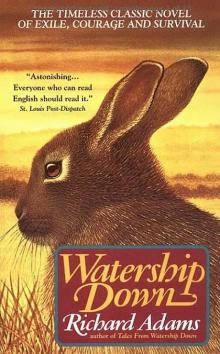 Watership Down
Watership Down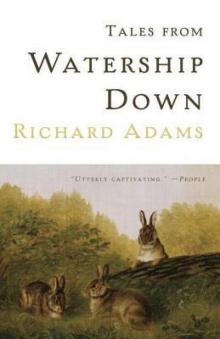 Tales From Watership Down
Tales From Watership Down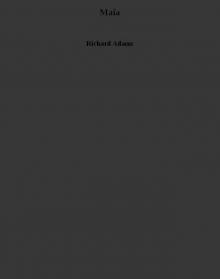 Maia
Maia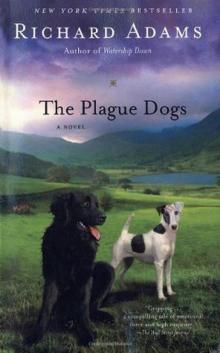 The Plague Dogs
The Plague Dogs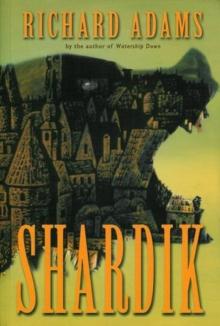 Shardik
Shardik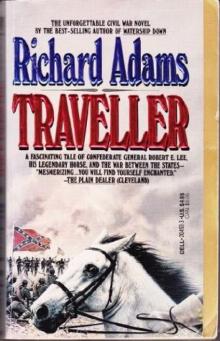 Traveller
Traveller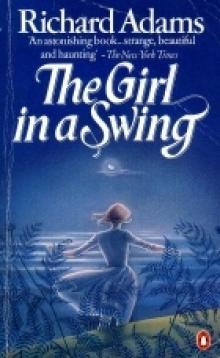 The Girl in a Swing
The Girl in a Swing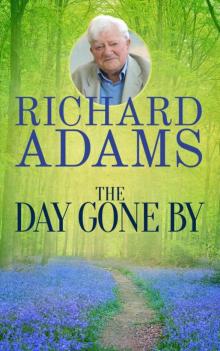 The Day Gone By
The Day Gone By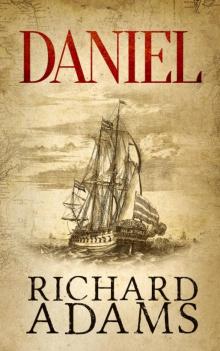 Daniel
Daniel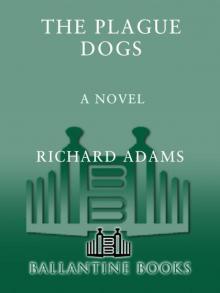 The Plague Dogs: A Novel
The Plague Dogs: A Novel